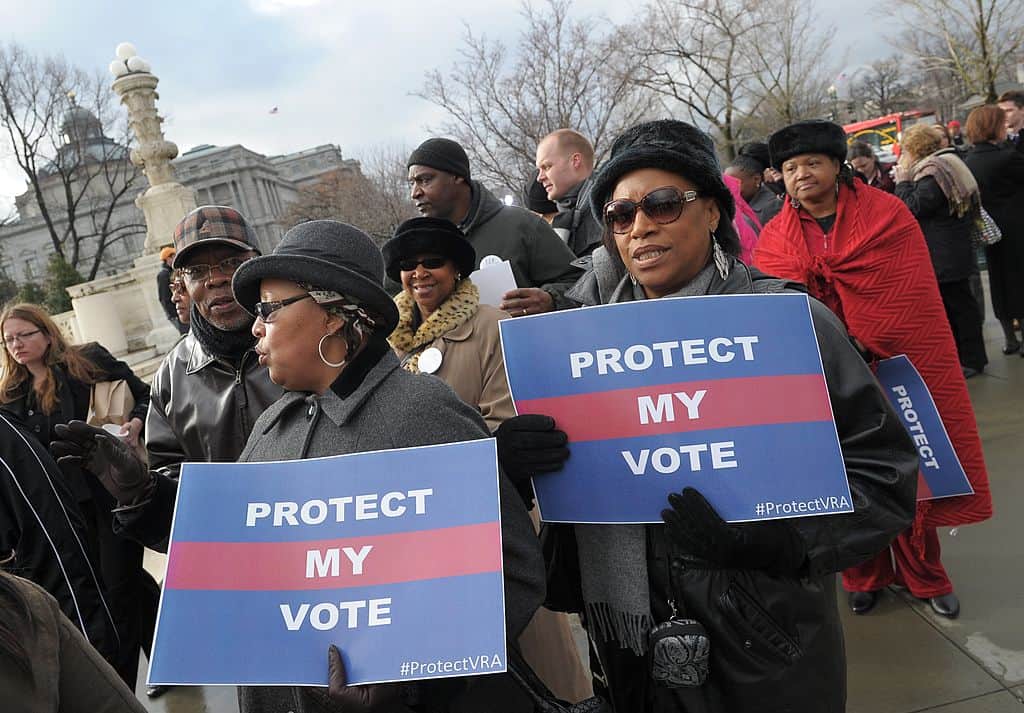As President Donald Trump continues to propagate groundless conspiracy theories about alleged voter fraud, let’s turn our attention towards the real conspiracy: voter suppression.
Seven years ago today, on June 25, 2013, the U.S. Supreme Court issued one of the most devastating decisions for voting rights. That decision opened the door to a slew of laws and changes that, across a number of southern states, has resulted in a marked disenfranchisement of minority voters. In Texas, the closing of hundreds of polling places along with the passing of an unnecessarily strict voter ID law can be traced back to that Supreme Court ruling.
In the case, Shelby County v Holder, the Court’s conservative majority struck down a “coverage formula” that had been used to identify jurisdictions, including the entire state of Texas, as subject to “preclearance” under the Voting Rights Act. That is, when covered jurisdictions wanted to change any aspect of their voting laws or practices, whether it be enacting a voter ID law or redrawing electoral districts, they were previously subject to federal approval.
Preclearance created a system of checks and balances. It was initially instated back when Lyndon B. Johnson signed the Voting Rights Act into law in 1965 so that states like Texas that had engaged in particularly egregious voter discrimination had an extra level of scrutiny.
And by all measures, preclearance was working.
Under preclearance, the federal government thwarted Texas from making discriminatory voting changes a total of 207 times – more than any other state under preclearance. As a result, the gap between white and black voter registration rates dropped dramatically, and we saw a clear increase in people voting.
Ironically, it was precisely this success of preclearance that the Court used to block the system from continuing. “Our country has changed,” Chief Justice John G. Roberts Jr. wrote for the majority in Shelby County. “While any racial discrimination in voting is too much, Congress must ensure that the legislation it passes to remedy that problem speaks to current conditions.”
Well, current conditions were solid because, not in spite of, the legislation. As Justice Ruth Bader Ginsberg put it in her dissent, “Throwing out preclearance when it has worked and is continuing to work to stop discriminatory changes is like throwing away your umbrella in a rainstorm because you are not getting wet.”
Predictably, eviscerating preclearance has been disastrous, especially in Texas, where
the Texas legislature has used its new unchecked authority to subvert the minority vote.
“I think the most immediate way Shelby affected voting was we started to see laws proposed and passed by the state legislature that would have never had a chance of going into effect before Shelby,” explained Joaquin Gonzalez, attorney for the Texas Civil Rights Project. “The voter ID law, which was previously rejected, was passed the very next legislative session after preclearance was gone.”
That voter ID law — one of the strictest in the country — made a Texas handgun license but not a student ID, a valid form of identification to present at the polls. This law has a clear discriminatory effect, as the individuals least likely to have an appropriate form of identification, including younger voters without licenses, are minorities.
Another impact of Shelby has been the closing of polling places in counties across Texas. A 2019 report found that 750 polling places were closed statewide since 2012, with a disproportionate number of them being in black and Latino neighborhoods. Specifically, the 50 counties that gained the most black and Latinx residents closed 542 polling places, while the counties that have gained the fewest black and Latinx residents closed just 34 polling locations.
“Previously, there would need to be a justification to close a polling place, and there would be a tracking of that,” said Thomas Buser-Clancy, senior staff attorney for the ACLU of Texas, adding that closing of individual polling places can now go unnoticed. “Closings are often justified through bureaucratic descriptions about funding and relocation. But when you zoom out and see where they are being closed, that’s when you see the harm.”
The impacts of Shelby are truly countless. Oftentimes, laws that seem mundane on their face have a discriminatory impact, and therefore would likely have been prevented with preclearance.
For instance, Gonzales pointed to the recent law that prohibits straight-ticket voting. Because of the sheer size of the ballot in Texas, this legislation dramatically increases the amount of time it takes to cast a ballot, resulting in longer wait times. Gonzales said it also tends to be the case that communities of color have a stronger preference of voting straight-ticket, regardless of whether they identify as Republican or Democrat.
Straight-ticket voting, along with most other rules around elections, are decided in the legislature. Yet individuals still have a role to play in advocating for citizens’ voting rights.
For instance, individuals can make it a priority to vote for people who champion voting rights. They can advocate for longer polling hours or more polling places in their own neighborhoods. They can be active public citizens by calling their county clerk offices, asking them what they are doing to make sure everyone can vote safely in the upcoming election, where we have already seen COVID-19 pose challenges to voting in other states.
“Putting pressure on those folks is critical,” said Buser-Clancy. “It’s important for all individual citizens to stand up for their right to vote and for the right to vote for all other citizens.”
Photo: MANDEL NGAN/AFP via Getty Images
Pooja is a contributing writer at the Texas Signal. She is focusing on feature stories that explore and explain the impact of legislation — or lack thereof — on vulnerable communities. Outside of the Texas Signal, Pooja is a staff writer at The Buzz Magazines, a community digital/print magazine in Houston, and is a graduate student in journalism at NYU. Pooja graduated from Yale University in 2016, where she studied psychology and economics and served as City Editor for the Yale Daily News.





